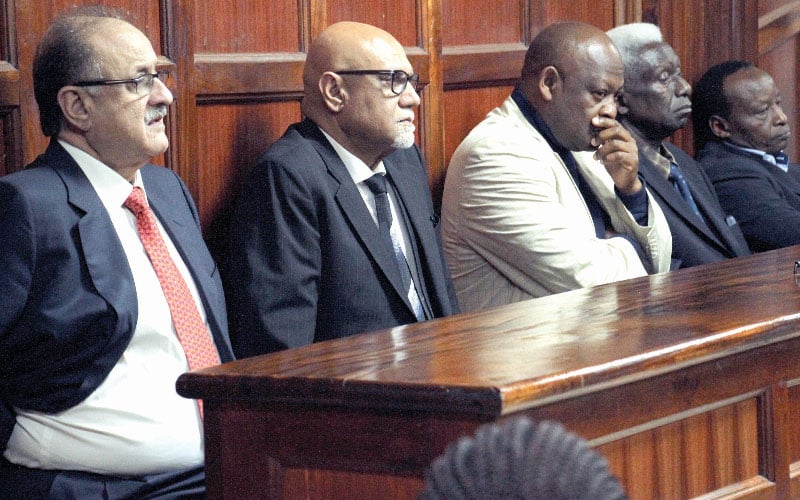Court told how Sh10b Anglo Leasing scam was executed
By Evans Maritim, October 25, 2019A detective with the Ethics and Anti-Corruption Commission (EACC) has laid bare how senior government officials trampled on all procurement laws to hand the Sh10 billion Anglo-Leasing contract to phantom companies.
The EACC detective narrated to the court how the State was defrauded of billions of shillings by ghost companies allegedly associated with the Kamani family.
Deepak Kamani has been charged with his brother Rashmi and father Chamanlal (deceased) with conspiring with government officials to defraud taxpayers of Sh10 billion through his companies Infotalent Limited, Apex Finance Corporation and Sound Day Corporation.
Also charged are former permanent secretaries Dave Mwangi, Joseph Magari, and former senior treasury employee David Onyonka.
Anglo Leasing was a series of security-related scandals involving 18 State security contracts in which the government entered finance lease and suppliers’ credit agreements to pay for forensic facilities, security equipment and support services for various defence units.
Testifying during their trial, EACC lead investigator Ignatius Wekesa told the court that the Kenya government entered into a contract with Sound Day Corporation, which was neither registered nor incorporated in the country, to supply police equipment worth billions of shillings.
The company also did not have any representative in Kenya, according to Wekesa.
He told the trial magistrate Felix Kombo that during his investigations, he retrieved several files from the Treasury and Office of the President related to the Anglo-Leasing contract that assisted him to unravel the scam.
Wekesa, who is the last witness to testify in the case, disclosed that the directors and faces behind the Sound Day Corporation have remained mysterious to date.
He further told the court that the address that Sound Day had given the government, purporting to be its office in London was fake as investigators who visited the UK could not locate it.
“None of the government officials direct or indirectly knew Sound Day Corporation and its directors. I never got any tangible information also about the MD of the company Brian Mills who signed documents and the contract on behalf of Sound Day Corporation,” Wekesa told the court.
He added that top officials in President Mwai Kibaki’s government involved in the scam committed the government to Euros 40 million (Sh10 billion) through promissory notes without knowing who were the directors of the ghost firms that were awarded the tender to supply police equipment.
Promissory note
A promissory note is a financial instrument that contains a written pledge by one party to the other to pay a defined sum of money, either on demand or at a specific future date.
According to the witness, Sound Day and Apex were ghost companies. Apex Finance corporation was a financier of the project.
The project sought to link all police stations in the country to boost efficiency and collaboration in fighting crime and maintenance of law our order.
He told the court that there was no loan agreement between the contracted company and user department. Only a suppliers agreement exist, he said.
Wekesa said that during investigations, he interviewed and recorded statements from several top officials in the Kibaki and Daniel arap Moi administrations who were adversely mentioned in the scandal.
Wekesa also produced in court a letter indicating that Sound Day on October 30, 2003 received a letter from the then Permanent Secretary Provincial Administration and National Security Dave Mwangi, seeking financial arrangements such as supplier’s credit to support the funding requirements of the government’s plans to modernise police equipment and accessories. The court heard that Mwangi was informing the company to attach the various security equipment quantities of each item listed in the contract documents.
In response, Sound Day Corporation, in a letter dated November 20, 2003, confirmed interest in the project.
It also wrote to Mwangi and Joseph Magari, then Permanent Secretary of the Treasury, requesting approval for direct procurement.
He said that on November 27, 2003 Mwangi wrote a memo to the Internal Security minister Chris Murungaru requesting approval of direct procurement of the contract. On December 5, 2003, Murungaru granted the approval of the modernisation contract for direct procurement, being national security contract.
On December 3, 2003, Mwangi wrote to the then Attorney General Amos Wako requesting a legal opinion on the contract.
According to a letter dated December 5, 2003, Wako’s office approved the contracts with conditions which were later met by Treasury and Internal Security ministry.
Agreement signed
The investigating officer informed the court that the AG’s office also permitted promissory notes to one Anglo leasing Sound day Corporation for the supply of security equipment.
On the same date upon the approval of Murungaru and the AG, Mwangi wrote to PS Treasury Joseph Nagari seeking for direct procurement of the police equipment. The court heard that Magari later committed the recommendations to the then Finance Minister David Mwiraria who approved the direct procurement of the project.
Wekesa informed the court that on December 17, Mwiraria gave a special authority under Section 7 of the external loan act to Onyonka (Debt Management) to sign the agreement of the contract and any other documents that requires financing the project.
The contract was later executed on December 23 by three entities namely on behalf of the Office of the President PS Mwangi, Ministry of Finance PS Magari and Sound Day Corporation MD Mills.
According the contract, the government was supposed to pay 3 per cent commitment fee amounting to Euros 1,786,898 upon signing the contract.
